If you’re considering getting a navy tattoo, it’s essential to understand the symbolism behind it. Navy tattoos are popular among sailors and veterans who want to showcase their pride for serving their country. In this article with Impeccable Nest, we’ll explore the various meanings of navy tattoos and what the navy symbolizes.
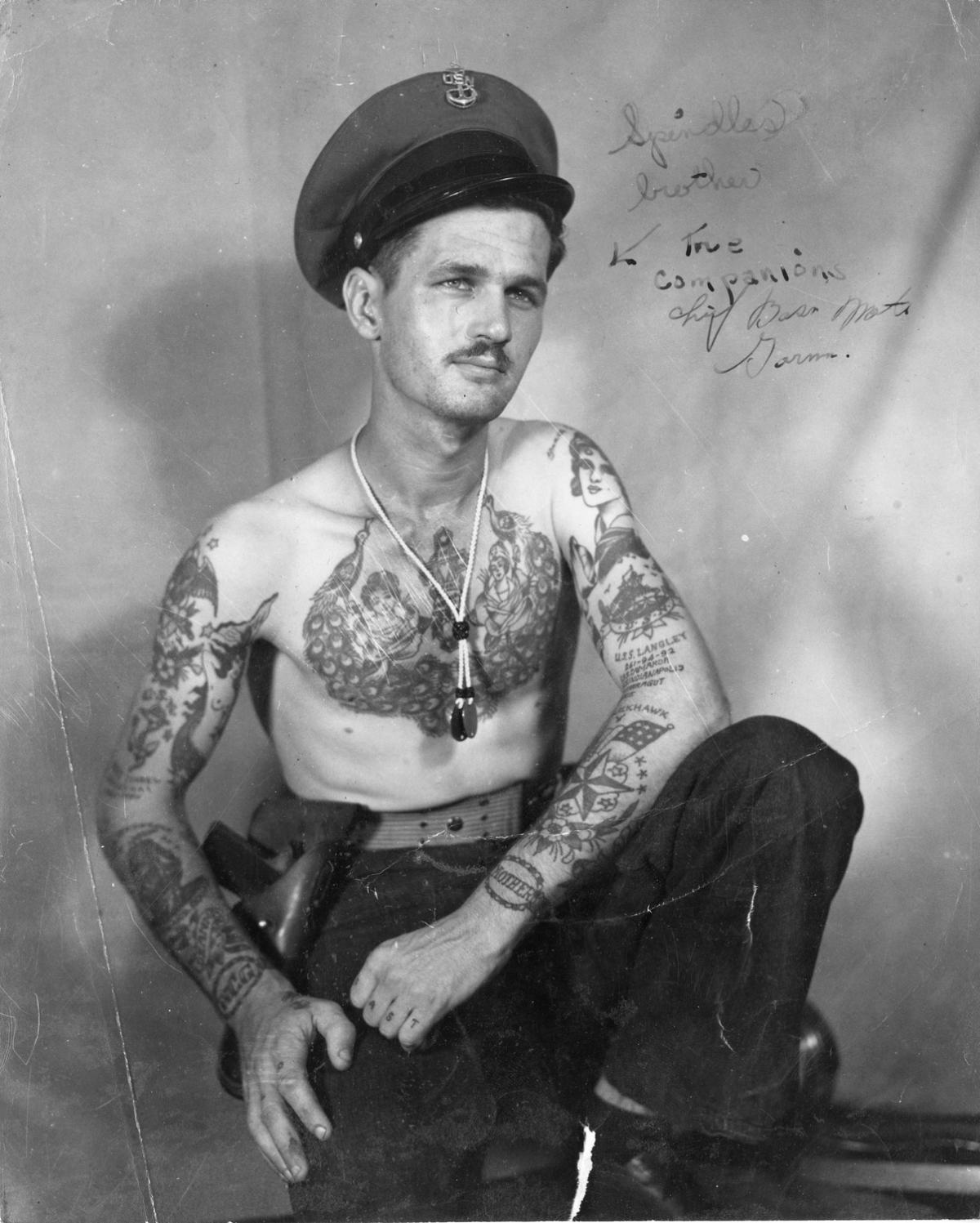
The History of Navy Tattoos
Tattoos have been a part of naval tradition for centuries. Sailors would often get tattoos to mark important events in their lives, such as crossing the equator for the first time, completing a long voyage, or surviving a shipwreck. These tattoos were also a way for sailors to identify one another and to show allegiance to their country and the navy.
One of the most famous navy tattoos is the anchor. The anchor represents stability and strength and is a symbol of hope for sailors at sea. Other popular navy tattoos include ships, compasses, waves, and stars.

Navy Tattoo Meanings: What is the Significance?
Navy tattoos represent a variety of things, from patriotism and nationalism to honor and respect. Each design carries its own meaning, but they all share one thing in common- they pay tribute to the U.S. Navy and those who serve or have served in it.
Anchor Tattoos
Navy tattoos have been a popular choice among military personnel and civilians alike for many years. These designs often incorporate traditional naval symbols, such as anchors, ships, compasses, and flags, but they can also include more personal elements like family names or dates of service. Regardless of the specific design, navy tattoos are widely seen as a way to express pride in the U.S. Navy and show respect for those who have served or are currently serving.
One of the primary meanings behind navy tattoos is patriotism. The U.S. Navy is an integral part of American history and culture, and many people choose to honor this heritage by getting a tattoo that depicts a Navy-related image or symbol. Patriotic navy tattoos might include an American flag waving alongside a Navy ship or emblem, or a bald eagle clutching a naval anchor in its talons.
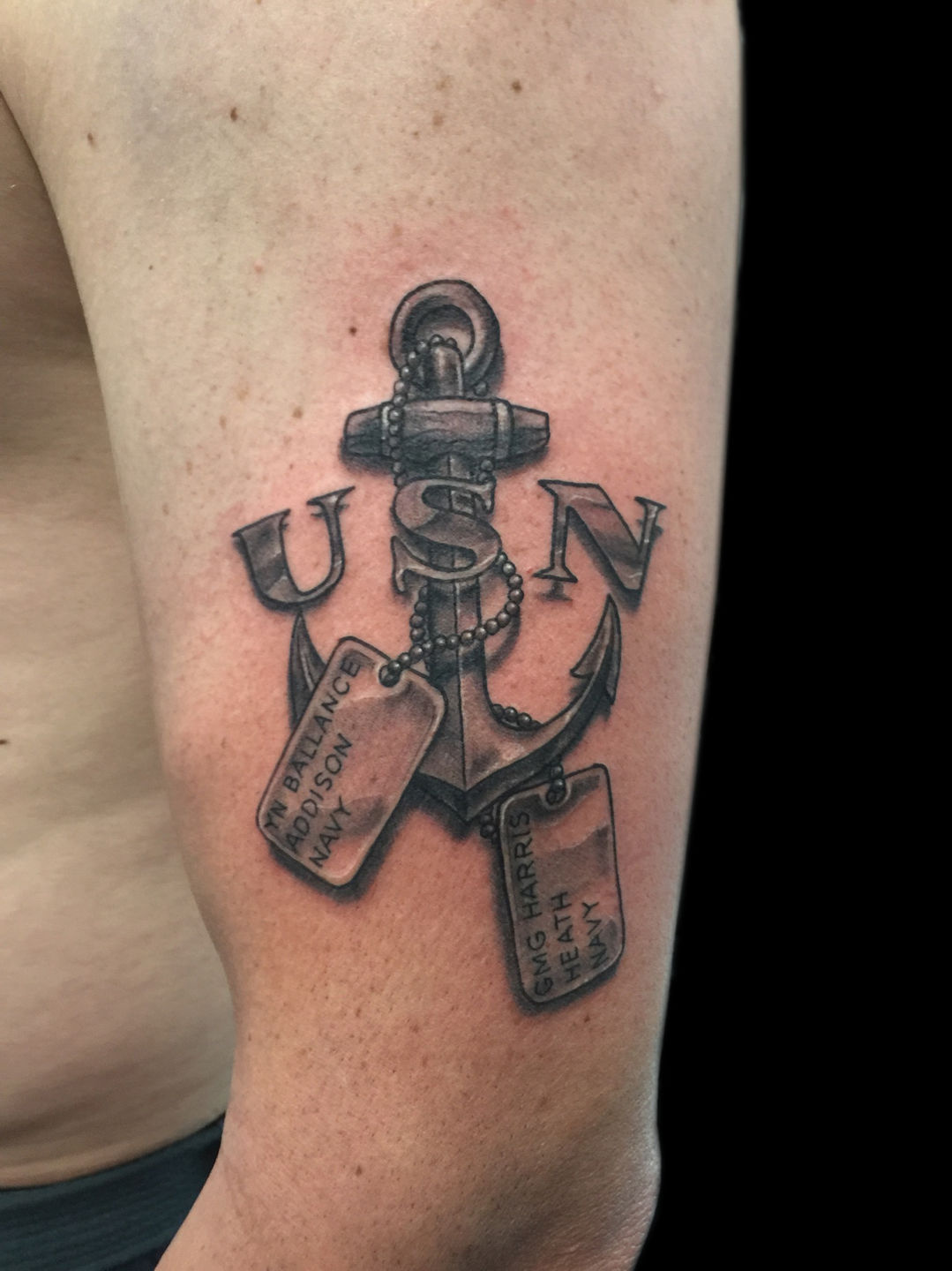
Another common meaning behind navy tattoos is nationalism. These designs often incorporate the colors of the U.S. flag – red, white, and blue – or other patriotic imagery to demonstrate a strong sense of national pride. Nationalistic navy tattoos may also feature quotes or phrases that emphasize the importance of service to country and devotion to duty.
Honoring and respecting those who serve or have served in the U.S. Navy is also a central theme in many navy tattoos. Sailors and other naval personnel put their lives on the line every day to protect the nation, and navy tattoos help to recognize these sacrifices and show appreciation for the dedication and bravery of these individuals. Some navy tattoos might depict specific ranks or medals earned by a service member, while others may feature a symbolic representation of the broader Navy community as a whole.
Ship Tattoos
Anchor tattoos have long been a popular choice among Navy personnel as they symbolize stability, strength, and hope. The anchor has been traditionally associated with sailors as it served as a crucial tool to keep ships from drifting off course during rough seas. This association with the sea has made the anchor a meaningful symbol for sailors who spend their lives at sea.
Beyond its practical use, the anchor represents a sense of groundedness and stability. For sailors, who often spend long stretches away from home and loved ones, the anchor provides a sense of comfort and familiarity. An anchor tattoo can serve as a reminder of one’s roots or home base, providing a sense of connection to family and friends even when far away.
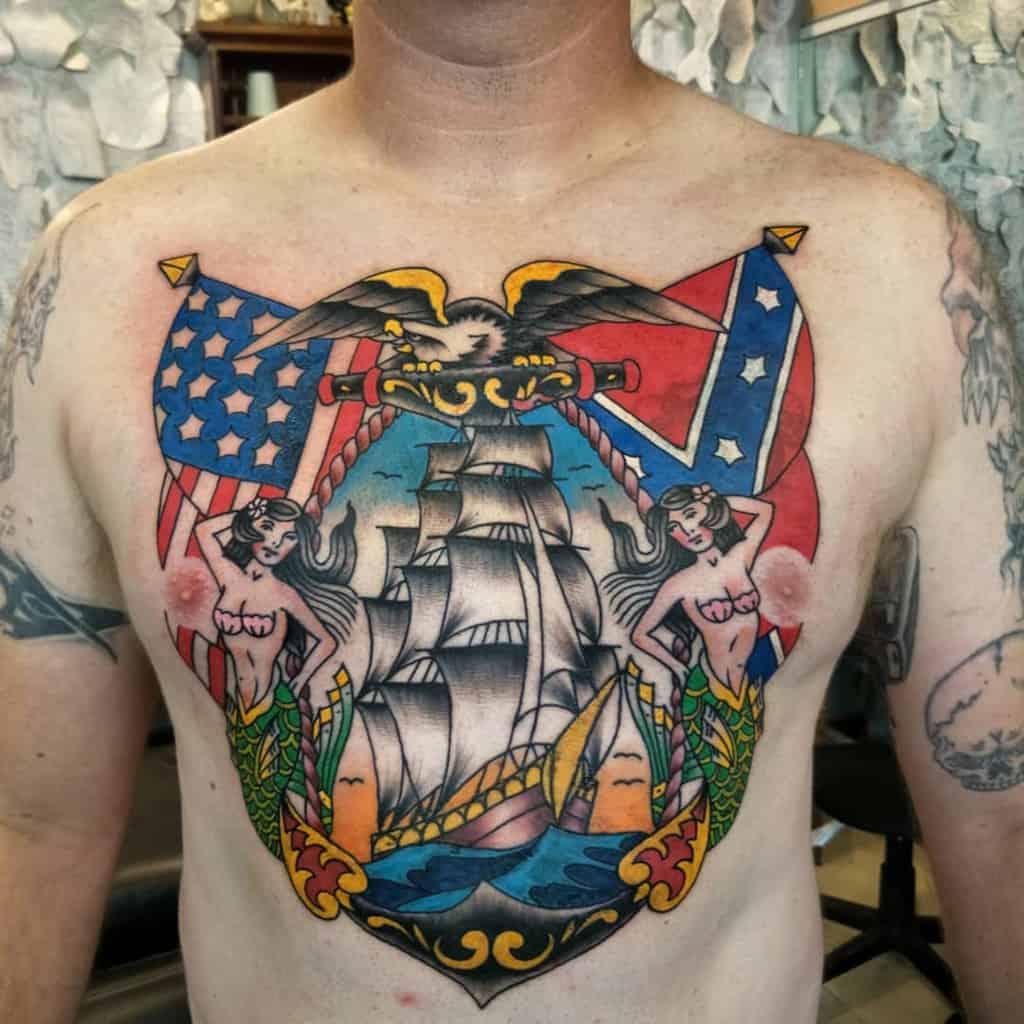
Additionally, an anchor tattoo can signify a sailor’s unwavering loyalty to the Navy and their commitment to the values it represents. With their lives on the line while serving their country, sailors often develop a deep sense of camaraderie and brotherhood with their fellow service members. An anchor tattoo can be a symbol of this bond, representing the shared experiences and sacrifices that come with serving in the Navy.
Eagle, Globe, and Anchor (EGA) Tattoos
Ship tattoos are a popular and classic design often associated with the navy and sailors. These tattoos typically depict an image of a ship, ranging from a small sailing vessel to a large warship or even an entire fleet. The meaning behind these tattoos is often rooted in the idea of adventure and exploration, as ships have historically been used to traverse vast oceans and discover new lands.
For sailors, a ship tattoo can also represent their connection to their vessel. It’s not uncommon for sailors to get tattoos that depict the name or image of their ship. This can be a way for them to honor and remember the time they spent aboard that particular vessel, and the camaraderie they shared with their fellow crew members.
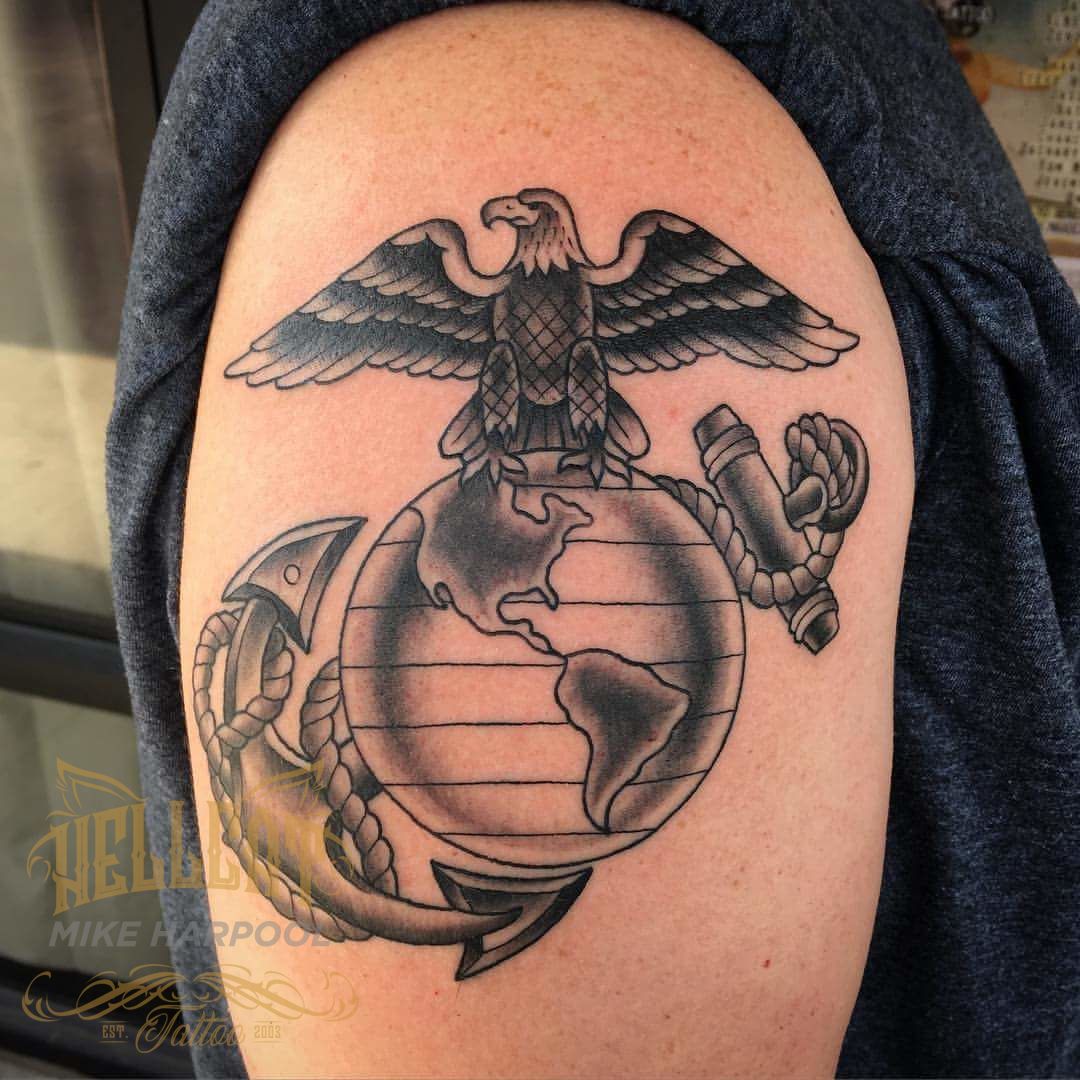
Additionally, a ship tattoo could signify an individual’s love for the sea and all its mysteries. The ocean has long been associated with the unknown, and those who are drawn to it are often seen as adventurous and curious. A ship tattoo may be a way for someone to express their affinity for the sea and the many adventures it offers.
Nautical Star Tattoos
Nautical star tattoos have been a popular tattoo choice among sailors for centuries due to their symbolic meaning. The five-pointed star design is closely associated with the North Star, which served as a crucial navigational guide for seafarers traveling the open seas at night. This star was used by sailors to determine their direction and ensure they were headed in the right direction.
In addition to its practical significance, the nautical star also holds a deeper symbolic meaning for sailors. It represents guidance and finding one’s way home, both physically and metaphorically. For sailors who spend extended periods away from loved ones and familiar surroundings, the nautical star tattoo provides comfort and serves as a reminder of their ultimate destination: returning home.
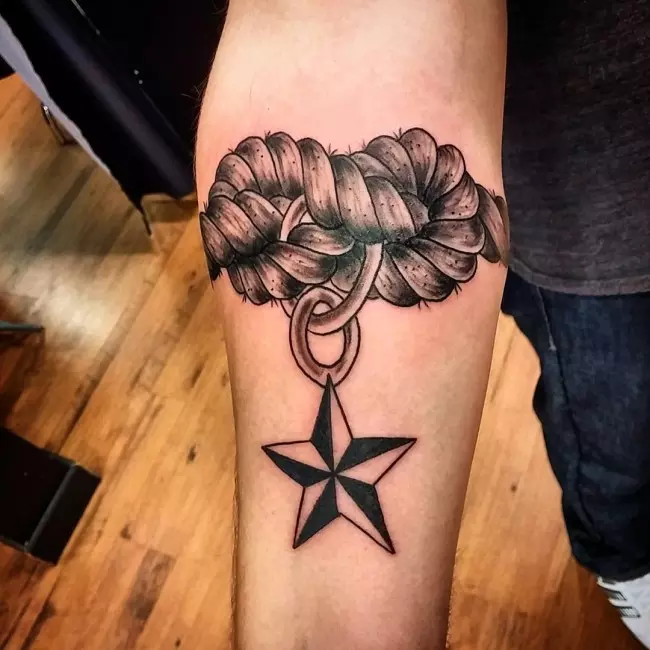
The nautical star tattoo can also be a powerful symbol for individuals who have embarked on a journey or experienced significant changes in their lives. It can serve as a reminder of the obstacles they’ve overcome and the progress they’ve made, while also offering guidance and direction as they navigate future challenges.
For those who have served in the Navy or other branches of the military, the nautical star tattoo holds even greater significance. It is a symbol of honor and camaraderie, representing the shared experiences and sacrifice of those who have served together. By getting a nautical star tattoo, veterans can commemorate their time in service and pay tribute to the bonds forged during their time in the military.
Compass Tattoos
Compass tattoos have been a popular design among sailors for many decades, as they represent direction and guidance. These tattoos are often paired with other nautical symbols such as anchors or ships to emphasize the sailor’s connection to the sea.
The compass itself is a tool that has been used for centuries by sailors to navigate the seas. It is a device that points towards the magnetic north pole, providing the user with a sense of direction even on the open waters. For sailors, having a reliable compass was essential for their survival and success on long journeys at sea.
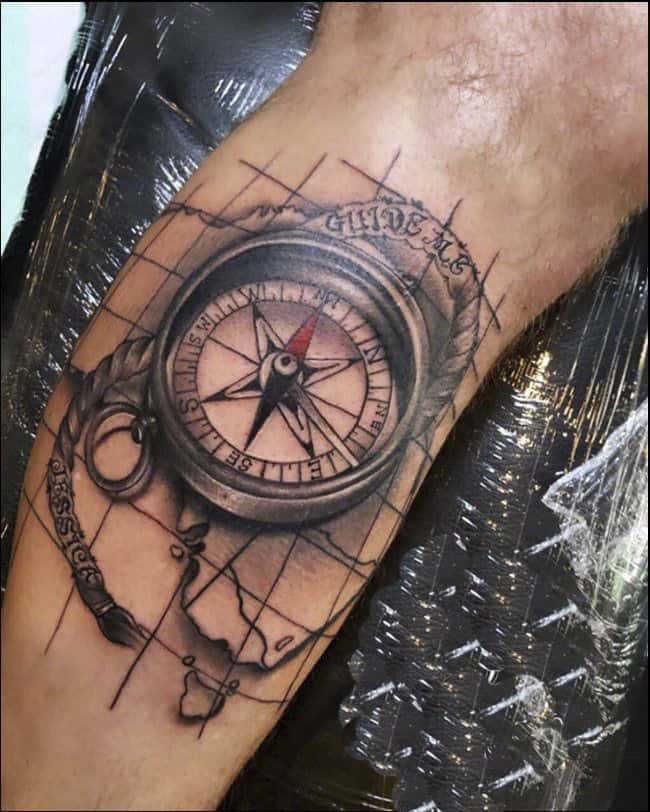
In tattoo form, the compass represents not only direction but also guidance in life. The compass can symbolize a sailor’s journey through life, highlighting their ability to navigate their way through challenges and obstacles. It can also represent a commitment to staying on the right path, both literally and figuratively.
Compass tattoos can be designed in various ways, with different colors and styles. Some people choose to incorporate geographic coordinates or meaningful dates into their design, adding a personal touch to their tattoo. Whatever the design may be, the compass tattoo remains a classic and enduring choice among sailors and anyone looking to symbolize their sense of direction and guidance in life.
Navy Symbolize: Unveiling the Symbolic Power
The Navy symbolizes a variety of things, from strength and bravery to freedom and patriotism. Here are some of the key meanings behind the Navy:
Strength and Bravery
Navy tattoos have been popular for decades, and they hold a deep meaning for those who choose to get them. The Navy as an institution has always represented strength and bravery, and it takes a great deal of courage to serve your country in this capacity. Sailors face numerous challenges while on duty, including harsh weather conditions, long periods away from home and loved ones, and potential danger.
Many sailors choose to commemorate their service with a tattoo that represents the Navy and all that it stands for. These tattoos often feature images of anchors, ships, eagles, and other symbols that are associated with the Navy. Each of these symbols carries its own unique meaning and significance.
For example, an anchor tattoo is one of the most popular Navy tattoos. An anchor is a symbol of stability, steadfastness, and hope. It represents the sailor’s commitment to his or her duty and the hope that they will return safely home. The anchor also represents the sailor’s connection to the sea, which is one of the defining characteristics of the Navy.

Another popular Navy tattoo design is the eagle. The eagle is a symbol of freedom, courage, and strength. It represents the ideals that the Navy strives to uphold, including bravery, loyalty, and honor. Eagles are often depicted flying over a ship or carrying a banner with the Navy emblem.
Ships are also a popular motif in Navy tattoos. A ship represents the sailor’s journey and the many adventures they have experienced while serving their country. It also represents the sailor’s connection to the sea and the vastness of the ocean. Many sailors choose to have a particular ship tattooed on their body, such as the USS Enterprise or the USS Nimitz.
Other common Navy tattoo designs include compasses, lighthouses, and other nautical-themed images. These tattoos all have their unique meanings and symbolism, and they serve as a way for sailors to express their pride in their service and their connection to the Navy.
Freedom
The Navy tattoo has a rich history and symbolism that reflects the values and traditions of the United States Navy. The anchor is perhaps the most recognizable symbol associated with the Navy, and it represents stability, strength, and the ability to weather any storm. The anchor also symbolizes the Navy’s role in securing the nation’s freedom and protecting its interests around the world.
Another common Navy tattoo design is the American eagle, which symbolizes courage, honor, and patriotism. The eagle is often depicted holding the anchor in its talons, serving as a powerful symbol of the Navy’s commitment to protecting the country’s freedom and defending its values.
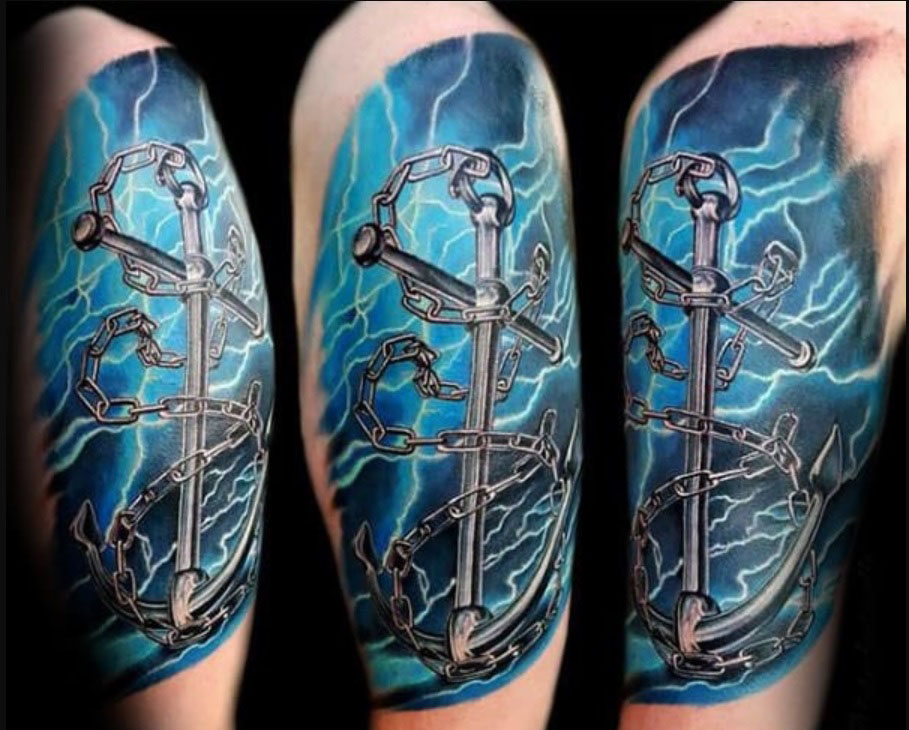

Other popular Navy tattoo designs include ships, lighthouses, compasses, and nautical stars. Ships represent the Navy’s role in patrolling the seas and projecting power around the world. Lighthouses symbolize guidance and safety, while compasses represent direction and navigation. Nautical stars are often used as a design element in Navy tattoos, and they symbolize guidance and good luck.
Patriotism
Navy tattoos are popular designs among those who have served or are currently serving in the United States Navy. These tattoos often feature images that reflect the values, traditions, and experiences of sailors in the Navy.
One of the most significant meanings behind Navy tattoos is patriotism. The Navy is a branch of the Armed Forces that is dedicated to serving our country and protecting its citizens. Sailors who choose to get Navy tattoos do so as a way to show their love and devotion to their country. By putting their lives on the line every day, sailors demonstrate their commitment to defending America and upholding its values.
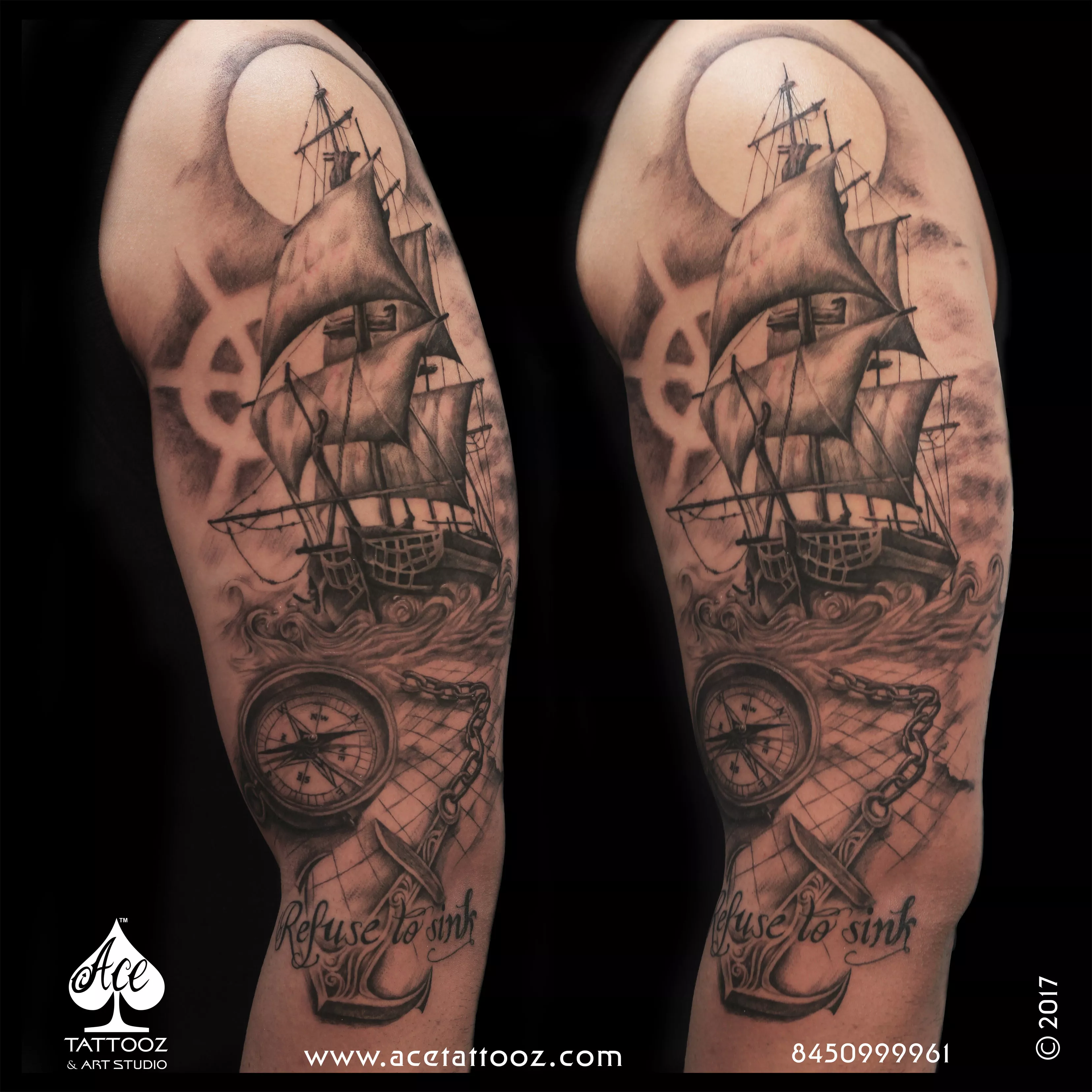
Another meaning behind Navy tattoos is pride. Serving in the Navy is a source of great pride and honor for those who have chosen to make it their career. Navy tattoos often feature symbols such as anchors, ships, and eagles that represent this sense of pride and dedication to the service.
In addition to these meanings, Navy tattoos can also be deeply personal for individual sailors. Many sailors choose to get tattoos that represent significant events or experiences from their time in the Navy. For example, a sailor may choose to get a tattoo of a ship they served on, a specific rank insignia, or an emblem from their unit.
Loyalty and Brotherhood
Navy tattoos have long been a popular form of body art among sailors, and they carry a deep meaning within the naval community. These tattoos serve as powerful symbols of the strong sense of loyalty and brotherhood that exists among sailors.
Sailors often spend extended periods of time away from their families and loved ones while serving at sea. During this time, they form close bonds with their fellow crew members, relying on one another for support and camaraderie. The tattoos they get serve as permanent reminders of these connections, marking them as part of a larger community of naval service members who share similar experiences and values.
In addition to representing loyalty and brotherhood, navy tattoos can also signify a sailor’s achievements and accomplishments. For example, a sailor might get a tattoo to commemorate a significant deployment or mission, or to honor a fallen comrade. These tattoos not only serve as personal reminders of important events in a sailor’s life, but also as markers of shared experiences and sacrifices made by members of the naval community.
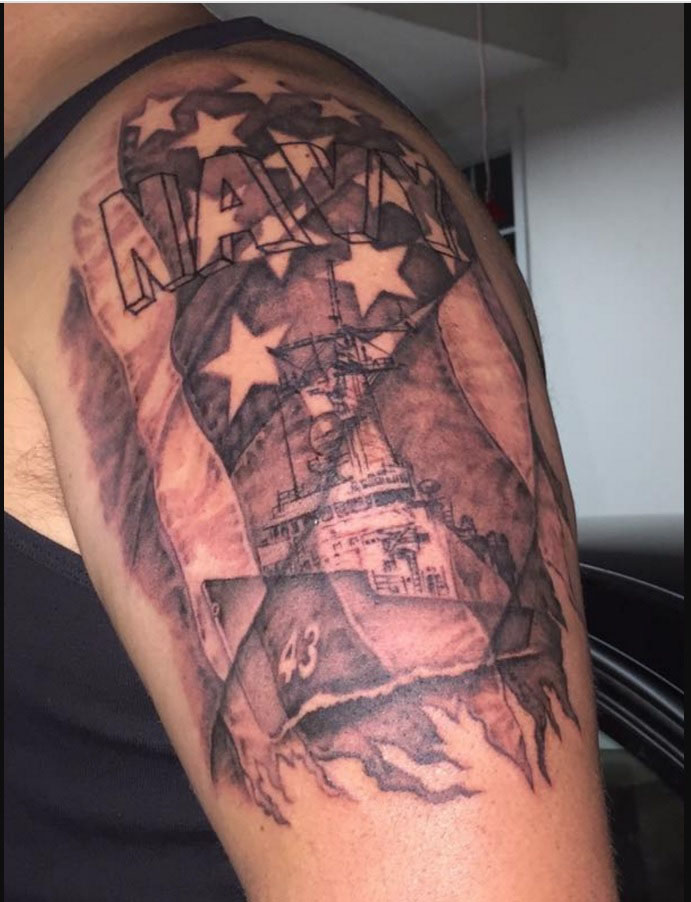
Beyond their symbolic significance, navy tattoos are also deeply rooted in tradition and history. Sailors have been getting tattoos for centuries, with designs and motifs evolving over time. Some common navy tattoo themes include anchors, ships, eagles, and compass roses. These designs are often highly detailed and intricate, reflecting the skill and artistry of the tattoo artist.
To many sailors, getting a navy tattoo is more than just a personal choice – it’s a way of cementing their place within the naval community and honoring the traditions and values of service. Whether simple or complex, these tattoos serve as powerful symbols of unity, camaraderie, and loyalty among sailors around the world.
Protection and Good Luck
Tattoos have been used as a form of personal expression for centuries, often carrying significant meanings and symbolism. Among the many tattoo designs that exist, one of the most popular and historically significant is the Navy tattoo.
Navy tattoos, also known as maritime tattoos, traditionally feature images of marine creatures such as dolphins, sharks, mermaids, or anchors, and are often worn by sailors and other seafaring individuals. These tattoos are believed to hold special meanings and symbolism, reflecting the wearer’s connection to the sea and the challenges and dangers of life at sea.
One of the primary meanings associated with Navy tattoos is protection. For sailors, the ocean can be a treacherous and unpredictable environment, and they look to these tattoos as powerful symbols of good fortune and protection against harm. Dolphins, for example, are highly intelligent and social animals that are known to protect and guide humans in distress. Thus, a dolphin tattoo might represent protection, guidance, and good luck for sailors who venture into the unknown.
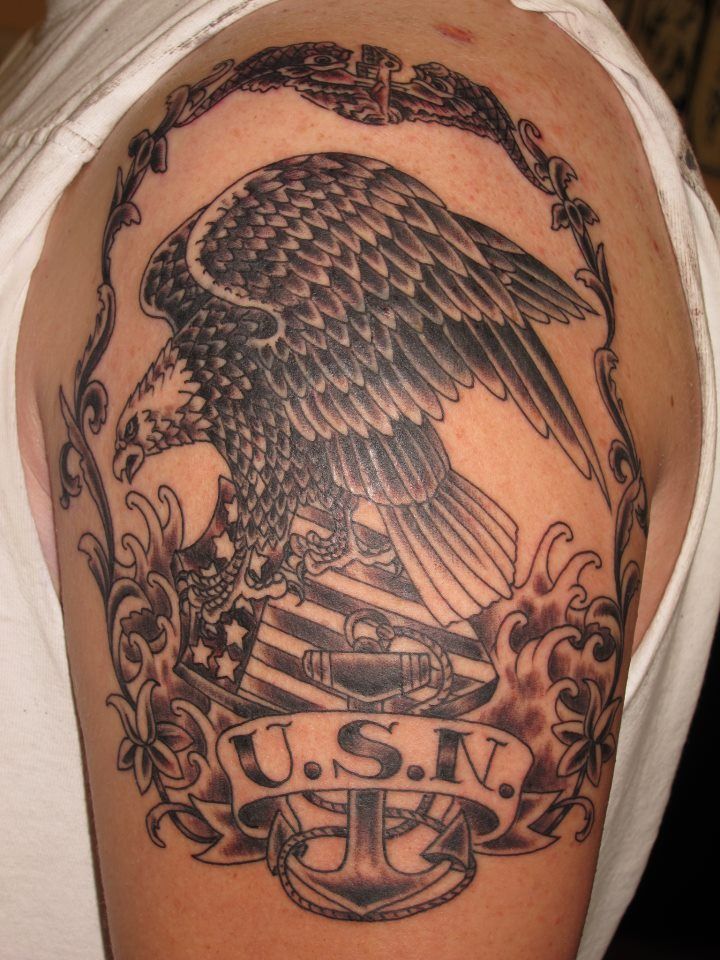
Sharks, on the other hand, are seen as fearsome creatures that command respect and inspire awe. A shark tattoo might symbolize strength, power, and fearlessness, traits that are highly valued among sailors who face the elements and unpredictable conditions of the sea. Additionally, sharks are often associated with danger, and a shark tattoo might serve as a reminder of the inherent risks of living an adventurous and daring life.
Mermaids, mythical creatures that are half-human and half-fish, are another popular image in Navy tattoos. Mermaids are often depicted as alluring and mysterious, representing the beauty and mystery of the sea. They are also known for their ability to lure sailors to their doom, and a mermaid tattoo might signify the allure and temptation of the sea, as well as the danger that comes with it.
In addition to marine creatures, Navy tattoos may also feature other nautical themes, such as anchors, ships, compasses, or lighthouses. These symbols represent the essential tools and landmarks that help sailors navigate the sea and find their way home.
Endurance and Resilience
Navy tattoos are a common form of body art among sailors, and they often hold deep significance in the naval community. These tattoos typically symbolize the challenges and endurance that sailors face while spending long periods of time on the open ocean.
Sailors often spend months at sea, facing unpredictable weather conditions and navigating through dangerous waters. The physical and mental demands of life aboard a naval vessel can take a toll on even the most experienced sailors. Navy tattoos serve as a visual representation of the hardships these sailors have faced and conquered.
One popular image in navy tattoos is that of an anchor. The anchor represents stability and strength, providing a sense of security for sailors when they are out at sea. This image can also symbolize a sailor’s commitment to their duty and their loyalty to their ship and crew.
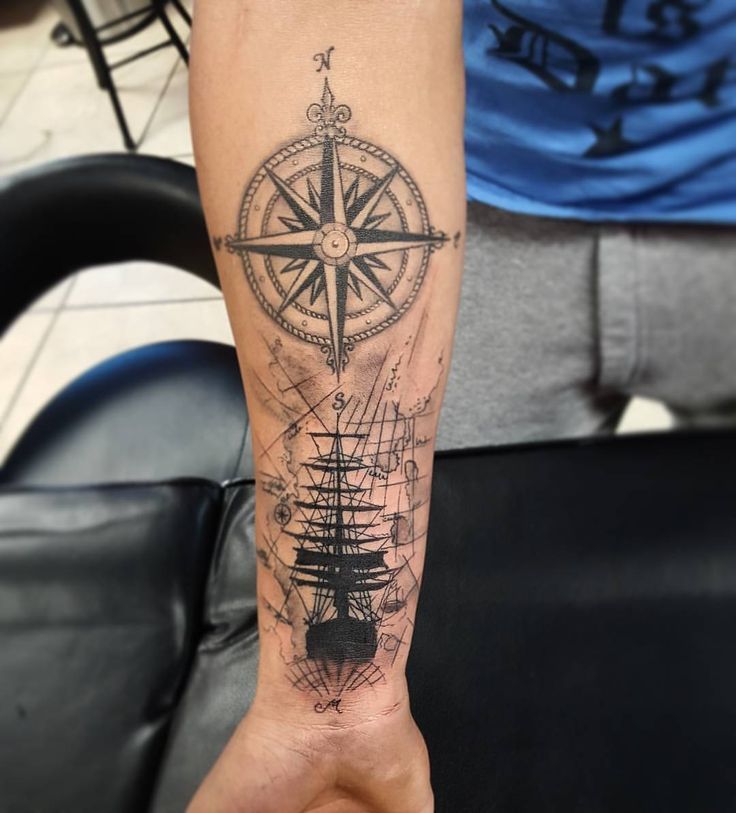
Another common navy tattoo design is that of a compass or nautical star. These images are meant to guide sailors through uncertain waters and help them find their way back home. They represent a sailor’s ability to navigate through life’s challenges and stay on course even when faced with adversity.
Some navy tattoos feature images of sea creatures such as sharks or octopuses. These tattoos can reflect a sailor’s respect for the power of the ocean and its inhabitants. They may also symbolize a sailor’s ability to adapt and survive in challenging environments.
Conclusion: Navy Tattoo Meanings
Navy tattoos are a powerful symbol of patriotism and honor. They represent the strength, bravery, and freedom embodiedby members of the U.S. Navy, as well as their deep connection to the sea. Whether you’re a sailor, veteran, or simply someone who admires the Navy’s mission, getting a navy tattoo can be a great way to show your pride and respect.
From anchor tattoos to ship tattoos, each design carries its own unique meaning and symbolism. The Navy itself represents many things, including strength, freedom, and patriotism. By exploring the meanings behind navy tattoos and the symbolic significance of the Navy, we hope to have given you a better understanding of why these designs are so popular among sailors and veterans.
So, if you’re considering getting a navy tattoo, take some time to research different designs and their meanings. Choose a design that speaks to you and represents your connection to the Navy in the most meaningful way possible.

I am Harvey Berry, a tattoo enthusiast who has immersed himself in the diverse world of ink, passionately exploring the beauty and artistry within each tattoo. My mission extends beyond uncovering the aesthetics of tattooing; it involves sharing in-depth knowledge across all aspects of this art form.
Fueled by genuine curiosity and love for every facet of tattooing, I have diligently crafted well-researched articles, with a special focus on the Tattoo Meaning of Impeccable Nest section. Here, my aim is to help the tattoo community gain a deeper understanding of the meanings and values embedded in each tattoo.
One of my primary goals is to encourage responsible decision-making when it comes to getting inked. I recognize that choosing to get a tattoo is a significant personal decision that requires careful consideration. Hence, I provide diverse resources covering the meaning of tattoos, the tattooing process, aftercare tips, and other valuable information.
Whether you are a seasoned tattoo enthusiast or embarking on your first exploration of the world of body art, I aspire to be a reliable resource for you at every step of your journey. I hope that my extensive knowledge of tattoos, especially in the Tattoo Meaning section, will assist you in finding inspiration to express yourself through the art of tattoos.
